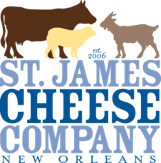Consider Bardwell Farm, producer of delicious cow and goat milk cheeses, was founded in 1864 by a man named Consider Stebbins Bardwell. It was the first milk co-op in Vermont, where farmers would bring their milk to be combined, and Consider (the person) would then make cheese from the milk. Many decades later, in the modern day, Consider Bardwell's cheesemaking team produces award-winning cheeses that give new meaning to the term "American Cheese".
Photo: Leslie examines wheels of cheese in the ageing room.
St. James asked head-cheesemaker Leslie Goff some questions about her life as a young cheesemaker:
You’ve been at Consider Bardwell from a young age: did you know from the beginning that you’d be there so long?
No, not at all. I started there in high school to pay for my horse habits and a vehicle when I was 15. I had no idea what actually went on at [Consider Bardwell] until I went there to work. I never have ever been the type to sit in an office all day. I grew up with horses, making maple syrup, skiing and snowmobiling. The longer I stayed the more it peaked my interests. When a cheese maker left I was given the opportunity to learn to make cheese, not just ageing it, so I took the ball and ran.
In an age when young professionals seem to change jobs often, what has been your experience growing up with your employer and staying there for an extended period of time?
As the business has grown, I've grown with it. It was been wonderful to be such a huge part of the growth and success of the creamery. I'm a very competitive person which has worked out well with both Angela and Russell the owners, as they are too! We always are striving for more!
What’s the most important skill or quality that makes a good cheesemaker?
A person who is meticulous and can multitask to the extreme. You have to be able to think on your feet when things don't go as expected. You don't want to ruin an entire vat of cheese if the automated cutters breakdown or your heating system fails you. You must decide quickly what to do, there's always a solution to the problem you just have to improvise.
What’s it like to be a young female cheesemaker in the industry?
I'm lucky enough to get out and meet new people in the industry who are supportive of what I'm doing at CBF. I've never had any negative experiences in the industry for being young or female. Lots of young woman are strong in the industry.
“Feminism” is such a buzz-word right now. What’s your perspective on feminism in the cheese industry? Do you think cheese needs feminism?
I do see a lot of female run creameries doing well, mine included. Majority of the [Consider Bardwell] creamery crew is women, not on purpose by any means, it just happened. It is a pleasure to work with other strong women in such a physical work environment. Lots of girl power!
Is there a part of cheesemaking that you still have to think hard about while you’re doing it? Or is it all muscle memory now?
Not unless something unexpected comes up or if we are developing a new product.
How often (if ever) does a batch result in something unexpected? As in, how often are you surprised at the result of your make?
Not very often as our recipes have been nearly perfected. If something happens to break down or some other fluke that is usually when we are wondering how the cheese will age out.
What’s the difference between a cheesemaker and other people who are helping in the room while a cheese is being made?
A cheesemaker is the one running the vats throughout the entire make. They are the ones measuring out cultures, rennet , following the pH closely and controlling the cooking of the curds. An assistants role in the make-room is to help hoop, do turns, and help clean up.
Ready to try some cheese made by Leslie and her team? Cheese available in our shops, or by clicking HERE.
Leslie shows off her tattoo of a cheesemaker in her likeness pouring a vat of milk, which transforms into a wheel of cheese.
Cheeses pictured: Dorset, Slyboro, Manchester. All with natural rinds and a basket weave imprint from the forms that turn curds into a wheel.








